人教版六年级英语上册第三单元
六年级英语上册人教版第三单元

六年级英语上册人教版第三单元一、重点单词。
1. next week.- 释义:下周,是表示将来时间的短语。
例如:I am going to Beijing next week.(我下周打算去北京。
)2. this morning/afternoon/evening.- 释义:今天上午/下午/晚上。
注意这些短语在句中的时态用法。
如果表示计划或者安排,常用一般将来时。
例如:I'm going to play football this afternoon.(我今天下午打算踢足球。
)3. tonight.- 释义:今晚。
例如:We are going to have a party tonight.(我们今晚打算举办一个派对。
)4. take a trip.- 释义:去旅行。
例如:They are going to take a trip to Shanghai.(他们打算去上海旅行。
)5. go to the cinema.- 释义:去看电影。
例如:She is going to go to the cinema tomorrow.(她明天打算去看电影。
)6. comic book.- 释义:漫画书。
例如:I like reading comic books.(我喜欢看漫画书。
)7. postcard.- 释义:明信片。
例如:He sent me a postcard from Paris.(他从巴黎给我寄了一张明信片。
)二、重点句型。
1. What are you going to do?- 用法:这是一个一般将来时的特殊疑问句,用来询问对方打算做什么。
回答时用“I'm/He's/She's/We're/They're going to +动词原形”的结构。
例如:- A: What are you going to do this weekend?- B: I'm going to visit my grandparents.2. When are you going?- 用法:这也是一般将来时的特殊疑问句,用来询问对方打算做某事的时间。
人教版pep英语六年级上册课文unitthree

Unit Three 第三单元My weekend plan 我的周末计划What are you going to do in the nature park? 你打算在自然公园做什么?I'm going to draw some pictures. 我要画画。
What about you? 你呢?I'm going to look for some beautiful leaves. 我要找一些漂亮的叶子。
Mike is going to see a film. 迈克要看电影。
John is going to buy his favourite comic book.约翰要买他最喜爱的连环画。
Hmm, what am I going to do this weekend? 唔,这周末我做什么呢?A Let's try 试一试It's Saturday morning. 星期六早上,Sarah is on the phone with Mike. 萨拉在和迈克打电话。
Listen and circle. 听,然后圈出。
Hi, Sarah. 嗨,萨拉。
Good morning, Mike. 早上好,迈克。
Today is so warm. 今天很暖和。
Let's go swimming. 我们去游泳吧。
Sorry, I can't. 对不起,我不能去。
I have to do my homework now. 我现在必须做作业。
B: OK. 好吧。
What about this afternoon? 那今天下午呢?No, I can't. 也不行。
I'm going fishing. 我要去钓鱼。
1. Can Mike go swimming today? 迈克今天能去游泳吗?2. Why or why not? 为什么?Let's talk 谈话Mike: What are you going to do tomorrow? 明天你打算做什么?Sarah: I'm going to have an art lesson. 我要上美术课。
六年级上册英语第三单元课文人教版
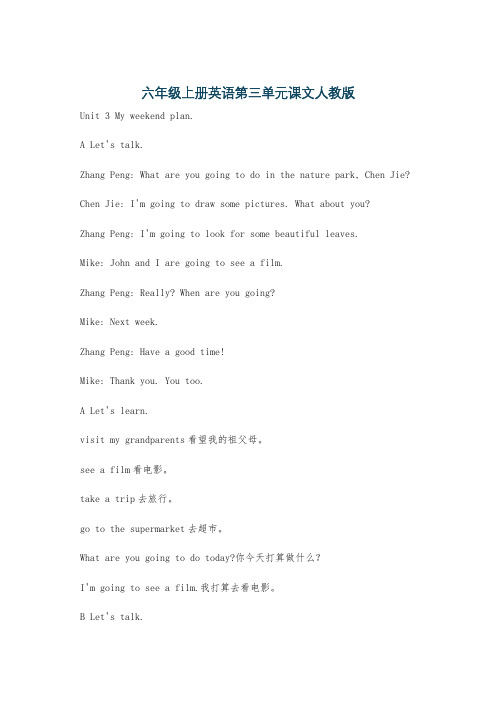
六年级上册英语第三单元课文人教版Unit 3 My weekend plan.A Let's talk.Zhang Peng: What are you going to do in the nature park, Chen Jie? Chen Jie: I'm going to draw some pictures. What about you?Zhang Peng: I'm going to look for some beautiful leaves.Mike: John and I are going to see a film.Zhang Peng: Really? When are you going?Mike: Next week.Zhang Peng: Have a good time!Mike: Thank you. You too.A Let's learn.visit my grandparents看望我的祖父母。
see a film看电影。
take a trip去旅行。
go to the supermarket去超市。
What are you going to do today?你今天打算做什么?I'm going to see a film.我打算去看电影。
B Let's talk.Sarah: What are you going to do tomorrow?Amy: I'm going to have an art lesson.Sarah: What are you going to do in your lesson?Amy: We're going to draw some pictures in Renmin Park. Sarah: Sounds great! I'm going to see a film tomorrow. Amy: Have a good time!Sarah: You too. I have to do my homework now. Bye.Amy: OK. Bye.B Let's learn.dictionary字典。
小学英语人教版(PEP)六年级上册第三单元U3_read_and_write

Task 5: Read quickly and guess.
快速浏览短文或图片,获取关键信息猜出对 应的节日。
Dear Diary,
Tomorrow is an important day! I can’t wait. In the morning, I’m going to go shopping with my parents. We are going to buy some gifts for each other. In the afternoon, my mother is going to cook. We are going to have a big dinner together. We are going to eat turkey. After dinner, we are going to sing songs and talk together. My grandma will tell stories about Christmas for us. Will I get gifts from Santa Claus?
快速阅读课文,回答以下问题。
❀What is the festival(节日) tomorrow?
Mid-Autumn Festival.
❀What are Wu Yifan’s family going to do?
Wu Yifan’s family are going to get together(聚会) and have a big dinner(吃大餐).
(圣诞老人)
go shopping decorate the Christmas tree
set off fireworks put up couplets
最新完整版人教版六年级英语上册第三单元知识点归纳总结及作文范文

Unit 3 My weekend plan一、词汇与短语1、重点单词1. visit /ˈvɪzɪt/ 拜访2.film /fɪlm/ 电影3.trip /trɪp/ 旅行4.supermarket /ˈsjuːpəmɑːkɪt/ 超市5.evening /ˈiːvnɪŋ/ 晚上;傍晚6.tonight /təˈnaɪt/ 在今晩7.tomorrow /təˈmɒrəʊ/ 明天8.dictionary /ˈdɪkʃənrɪ/ 词典ic /ˈkɒmɪk/ 滑稽的10.word /wɜːd/ 单词11.postcard /ˈpəʊstkɑːd/ 名信片12.lesson /ˈlesn/ 课13.space /speɪs/ 太空14.travel /ˈtrævl/ (尤指长途)旅行15.half /hɑːf/ 一半16.price /praɪs/ 价格17.together /təˈɡeðə(r)/ 一起18.mooncake /'mu:nkeɪk/ 月饼19.poem /ˈpəʊɪm/ 诗20.moon /mu:n/ 月亮2、重点短语1. see a film 看电影2.take a trip 去旅行3.next week 下周ic book (儿童的)连环画册5.word book 单词书6.get together 聚会7.Mid-Autumn Festival/ˈmɪd ˈɔːtəm ˈfestɪvl/ 中秋节8.visit my grandparents去看望我的祖父母9.go to the supermarket 去超市10.this morning/afternoon/evening今天上午/下午/晚上11.in the nature park 在自然公园12.draw some picture 画些画13.some beautiful leaves一些美丽的叶子14.look for 寻找15.have an art lesson 上美术课16.have a good time 玩得愉快17.have to=must 不得不18.do my homework做我的家庭作业19.go ice-skating 去滑冰20.wash clothes 洗衣服21.make a snowman 堆雪人22.go for a picnic 去野餐23.space travel 太空旅行24.a lot of=lots of 许多25.half price 半价26.have a big dinner 吃顿丰盛的晚餐27.make mooncake 做月饼28.tell sb. a story 给某人讲一个故事29.read a poem 读一首诗30.go to the swimming pool 去游泳池31.be afraid of……害怕什么32.learn by going 边走边学33.sounds great 听起来很棒3、重点句子1. What are you going to do tomorrow? 你你你你你你你你你I'm going to have an art lesson. 你你你你你你你2.We're going to draw some pictures in Renmin Park. 你你你你你你你你你你你你3.Where are you going? 你你你你你你你你We're going to the cinema. 你你你你你你你你你4.When are you going? 你你你你你你你你5.We're going to see a film about space travel.你你你你你你你你你你你你你你你你你6.Why not go on Tuesday你 你你你你你你你你你7.I have to do my homework now. 你你你你你你你你你8.Can I help you你 你你你你你你你 你你你你你你你你二、语法知识点1、一般将来时⑴ —般将来时的概念单一动作反复发生的动作持续的动作和状态过去现在将来❶时间状语tomorrow/tomorrow morning/next month/next year或“in+一段时间”)如:My friend will go to China next year. 我的朋友明年去中国。
人教版六年级英语上册第三单元知识点归纳(飞)
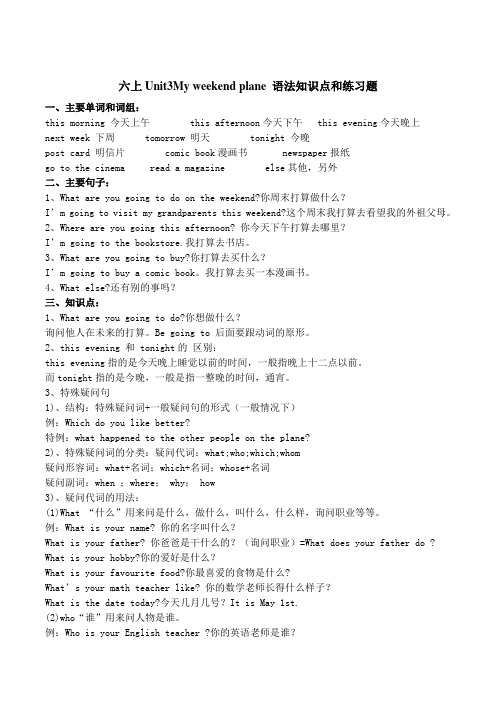
六上Unit3My weekend plane 语法知识点和练习题一、主要单词和词组:this morning 今天上午 this afternoon今天下午 this evening今天晚上next week 下周 tomorrow 明天 tonight 今晚post card 明信片 comic book漫画书 newspaper报纸go to the cinema read a magazine else其他,另外二、主要句子:1、What are you going to do on the weekend?你周末打算做什么?I’m going to visit my grandparents this weekend?这个周末我打算去看望我的外祖父母。
2、Where are you going this afternoon? 你今天下午打算去哪里?I’m going to the bookstore.我打算去书店。
3、What are you going to buy?你打算去买什么?I’m going to buy a comic book。
我打算去买一本漫画书。
4、What else?还有别的事吗?三、知识点:1、What are you going to do?你想做什么?询问他人在未来的打算。
Be going to 后面要跟动词的原形。
2、this evening 和 tonight的区别:this evening指的是今天晚上睡觉以前的时间,一般指晚上十二点以前。
而tonight指的是今晚,一般是指一整晚的时间,通宵。
3、特殊疑问句1)、结构:特殊疑问词+一般疑问句的形式(一般情况下)例:Which do you like better?特例:what happened to the other people on the plane?2)、特殊疑问词的分类:疑问代词:what;who;which;whom疑问形容词:what+名词;which+名词;whose+名词疑问副词:when ;where; why; how3)、疑问代词的用法:(1)What “什么”用来问是什么,做什么,叫什么,什么样,询问职业等等。
新人教版(PEP)六年级上册英语《Unit3 My weekend plan》教案

新人教版(PEP)六年级上册英语《Unit3 My weekend plan》教案一. 教材分析《Unit 3 My weekend plan》是人教版(PEP)六年级上册英语第三单元的主题课文。
本节课主要让学生掌握一般将来时态,能够用英语描述自己的周末计划。
教材通过贴近学生生活的情境,引导学生学习、理解和运用语言,培养他们的语言运用能力。
二. 学情分析六年级的学生已经掌握了基本的英语语法知识和一定的词汇量,具备一定的听、说、读、写能力。
但学生在语言运用方面还存在一定的困难,特别是在口语表达和句子结构方面。
因此,在教学过程中,教师需要关注学生的个体差异,因材施教,充分调动学生的积极性,激发他们的学习兴趣。
三. 教学目标1.知识目标:–能够听、说、读、写一般将来时态的句子。
–掌握描述周末计划的相关词汇和表达方式。
2.能力目标:–能够用英语简单描述自己的周末计划。
–提高学生的听说能力和语言运用能力。
3.情感目标:–培养学生热爱生活、珍惜时间的积极情感。
–增强学生之间的人际交往和合作能力。
四. 教学重难点•一般将来时态的句子结构。
•描述周末计划的相关词汇和表达方式。
•一般将来时态的运用。
•句子结构的灵活运用。
五. 教学方法1.情境教学法:通过设定生活情境,让学生在实际语境中学习和运用语言。
2.交际教学法:引导学生进行小组合作、角色扮演等互动活动,提高学生的语言运用能力。
3.任务型教学法:设计具有实际意义的学习任务,让学生在完成任务的过程中学习和运用语言。
六. 教学准备1.教材、课件和教学资源。
2.教学卡片、图片等辅助教具。
3.录音机、投影仪等教学设备。
七. 教学过程1.导入(5分钟)–教师通过提问方式引导学生谈论自己的周末计划,激发学生的学习兴趣。
–学生分享自己的周末计划,教师给予鼓励和反馈。
2.呈现(10分钟)–教师展示本节课的主题和目标,引导学生关注一般将来时态。
–通过图片、卡片等辅助教具,呈现描述周末计划的相关词汇和表达方式。
最新PEP人教版英语六年级上册第三单元知识总结
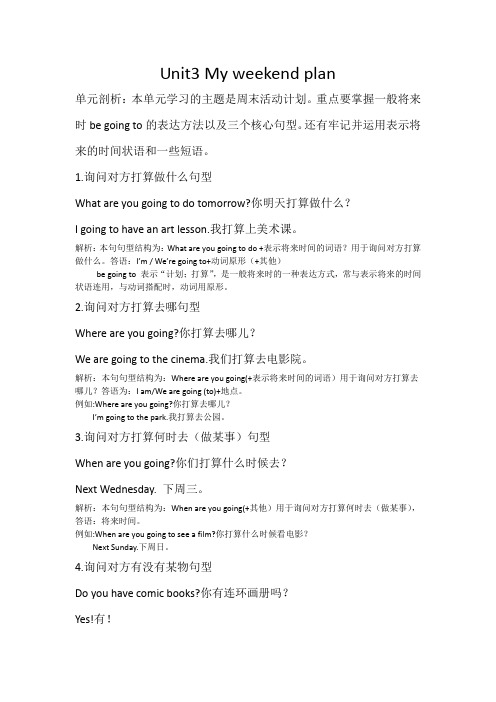
Unit3 My weekend plan单元剖析:本单元学习的主题是周末活动计划。
重点要掌握一般将来时be going to的表达方法以及三个核心句型。
还有牢记并运用表示将来的时间状语和一些短语。
1.询问对方打算做什么句型What are you going to do tomorrow?你明天打算做什么?I going to have an art lesson.我打算上美术课。
解析:本句句型结构为:What are you going to do +表示将来时间的词语?用于询问对方打算做什么。
答语:I’m / We’re going to+动词原形(+其他)be going to 表示“计划;打算”,是一般将来时的一种表达方式,常与表示将来的时间状语连用,与动词搭配时,动词用原形。
2.询问对方打算去哪句型Where are you going?你打算去哪儿?We are going to the cinema.我们打算去电影院。
解析:本句句型结构为:Where are you going(+表示将来时间的词语)用于询问对方打算去哪儿?答语为:I am/We are going (to)+地点。
例如:Where are you going?你打算去哪儿?I’m going to the park.我打算去公园。
3.询问对方打算何时去(做某事)句型When are you going?你们打算什么时候去?Next Wednesday. 下周三。
解析:本句句型结构为:When are you going(+其他)用于询问对方打算何时去(做某事),答语:将来时间。
例如:When are you going to see a film?你打算什么时候看电影?Next Sunday.下周日。
4.询问对方有没有某物句型Do you have comic books?你有连环画册吗?Yes!有!解析:本句句型结构为:Do you have +某物?用于询问对方有没有某物,do在这里是助动词无任何词义,have在这里意为“有,拥有”。
人教版六年级英语上册第三单元知识点归纳
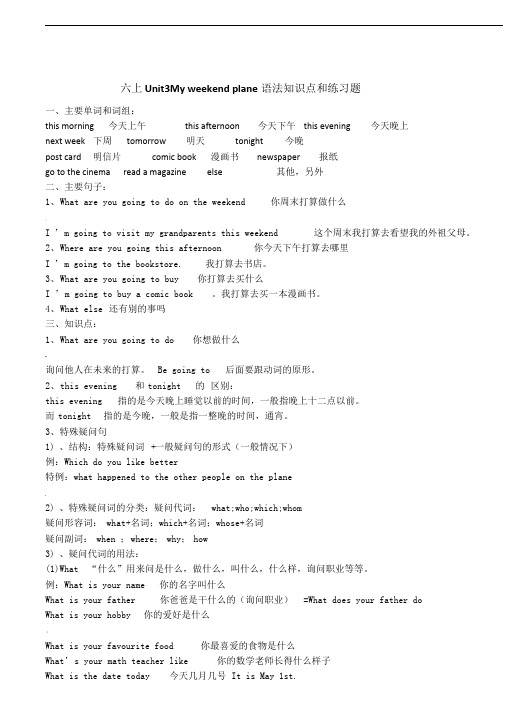
六上Unit3My weekend plane 语法知识点和练习题一、主要单词和词组:this morning 今天上午this afternoon 今天下午this evening 今天晚上next week 下周tomorrow 明天tonight 今晚post card 明信片comic book 漫画书newspaper 报纸go to the cinema read a magazine else 其他,另外二、主要句子:1、What are you going to do on the weekend 你周末打算做什么\I ’m going to visit my grandparents this weekend 这个周末我打算去看望我的外祖父母。
2、Where are you going this afternoon 你今天下午打算去哪里I ’m going to the bookstore. 我打算去书店。
3、What are you going to buy 你打算去买什么I ’m going to buy a comic book 。
我打算去买一本漫画书。
4、What else 还有别的事吗三、知识点:1、What are you going to do 你想做什么-询问他人在未来的打算。
Be going to 后面要跟动词的原形。
2、this evening 和tonight 的区别:this evening 指的是今天晚上睡觉以前的时间,一般指晚上十二点以前。
而tonight 指的是今晚,一般是指一整晚的时间,通宵。
3、特殊疑问句1) 、结构:特殊疑问词+一般疑问句的形式(一般情况下)例:Which do you like better特例:what happened to the other people on the plane:2) 、特殊疑问词的分类:疑问代词:what;who;which;whom疑问形容词: what+名词;which+名词;whose+名词疑问副词: when ;where;why;how3) 、疑问代词的用法:(1)What “什么”用来问是什么,做什么,叫什么,什么样,询问职业等等。
人教版六年级上册英语第三单元

第一部分:概述【1】人教版六年级上册英语第三单元是一个涉及日常生活和学习的单元,内容涵盖了日常活动、学校生活及家庭生活等方面的知识。
【2】该单元的学习不仅涵盖了英语语言能力的提升,更重要的是培养了学生的实际运用能力和生活技能。
【3】下面将对该单元的重点内容进行详细阐述。
第二部分:日常活动【1】在日常活动部分,学生将学习如何表达日常活动和习惯,如用英语表达早起、吃早餐、上学等。
【2】这部分内容丰富多彩,涉及到日常生活的方方面面,有利于学生真实地感受和运用英语表达自己的日常生活。
【3】通过日常活动的学习,学生将能够初步掌握英语的实际运用能力,并能够与外国人进行简单交流。
第三部分:学校生活【1】学校生活是学生日常生活和学习生活的重要部分,该单元内容将教授学生如何用英语描述学校生活的各个方面,如上学、上课、放学等。
【2】学校生活的内容相对繁多,需要学生掌握的词汇量较大,因此老师需要适当安排时间,让学生有充分的时间进行听、说、读、写的训练。
【3】通过学校生活的学习,学生将能够对自己的学校生活进行简单而准确的描述,并能够表达自己的感受和体会。
第四部分:家庭生活【1】家庭是每个学生生活的重要组成部分,通过该单元的学习,学生将学习如何用英语表达家庭生活的相关内容,如做饭、洗衣、打扫卫生等。
【2】这部分内容相对实用,学生可以通过实际家庭生活的例子来进行学习和训练,从而更好地掌握相关知识。
【3】通过家庭生活的学习,学生不仅能够提高英语的实际运用能力,还能够增进对家庭生活的了解和体验。
第五部分:总结【1】人教版六年级上册英语第三单元的学习内容丰富多彩,涉及日常活动、学校生活及家庭生活等方面的知识。
【2】通过学习该单元内容,学生将能够初步掌握英语的实际运用能力,并能够在日常生活中用英语进行简单交流。
【3】希望老师和学生能够充分重视该单元的学习,通过创造性的教学方式和方法,激发学生学习英语的兴趣和热情,使学生能够更好地掌握和运用该单元的知识。
人教版六年级英语上册第三单元课件PPT
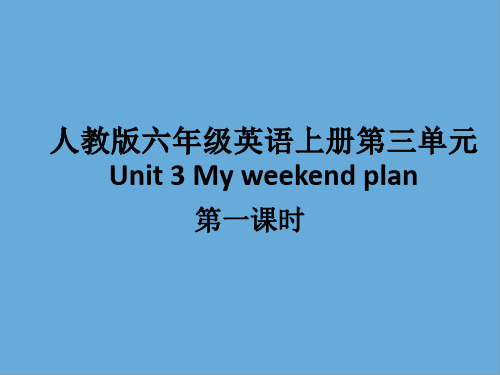
Unit 3 My weekend plan
第三课时
take a trip
see a film
visit my grandparents
go to the supermarket
Make a report
• If today is Saturday, what is your father or mother going to do? —My father is going to the park this morning. He is going to …. —My mother is going to …
Christmas Day
What food do you usually eat that day? We usually eat mooncakes.
Do you want to know what I usually do on Mid-Autumn Festival?
My family are going to get together and have a big dinner.
p__st c__ __d
名词单数变复数
• 一般情况,在词尾加-s,如: apples, monkeys
• 以s,x,sh,ch,结尾的单词,加-es,如: boxes, watches
• 以辅音加y结尾的单词,变y为i加-es,如 dictionary—dictionaries
Role-play
What are you going to do this evening?
What are you going to do this morning / afternoon/ evening/ tonight/ tomorrow/ next week?
六年级上册英语人教版第三单元单词

六年级上册英语人教版第三单元单词Unit 3 My weekend plan一、单词1. visit- 英标:[ˈvɪzɪt]- 词性:动词,意为“拜访;参观”。
例如:I'm going to visit my grandparents this weekend.(这个周末我打算去看望我的祖父母。
)2. film- 英标:[fɪlm]- 词性:名词,意为“电影”。
例如:I want to see a film tonight.(今晚我想看电影。
)3. see a film- 英标:[siːə fɪlm]- 词性:动词短语,意为“看电影”。
例如:Let's see a film together.(让我们一起看电影吧。
)4. trip- 英标:[trɪp]- 词性:名词,意为“旅行”。
例如:We are going on a trip next week.(我们下周要去旅行。
)5. take a trip- 英标:[teɪk ə trɪp]- 词性:动词短语,意为“去旅行”。
例如:They will take a trip to Beijing.(他们将去北京旅行。
)6. supermarket- 英标:[ˈsuːpəmɑːkɪt]- 词性:名词,意为“超市”。
例如:My mother often goes to the supermarket on weekends.(我妈妈经常在周末去超市。
)7. evening- 英标:[ˈiːvnɪŋ]- 词性:名词,意为“晚上;傍晚”。
例如:We will have a party this evening.(今晚我们将举行一个聚会。
)8. tonight- 英标:[təˈnaɪt]- 词性:名词,意为“今晚”。
例如:I'm going to study English tonight.(今晚我打算学习英语。
)9. tomorrow- 英标:[təˈmɒrəʊ]- 词性:名词,意为“明天”。
人教版六年级英语上册第三单元课件

2020/3/23
胜坨中学 宋敬莲
on Friday afternoon
---What are you going to do on Friday
afternoon? 周五下午你打算干什么? ---I’m going to go home。
2020/3/23
tomorrow
2020/3/23
visit
visit my parents
visit
see a film
supermarket
take a trip
2020/3/23
evening night
tonight
next week tomorrow
A: What are you going to do this evening/tonight/tomorrow/next week?
A. He has homework to do. B. He is going to fish now.
2020/3/23
What is Mike going to do tomorrow?
2020/3/23
1、What is Sara going to do tomorrow?
She is going to have an art lesson.
---What are you going to do nextat Wall.
2020/3/23
2020/3/23
film
see a film
supermarket
go to the supermarket
2020/3/23
take a trip
我打算回家
人教版六年级英语上册第三单元单词
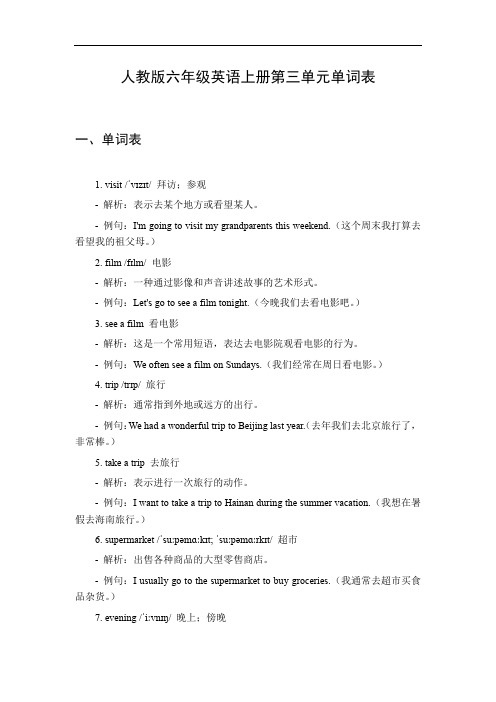
人教版六年级英语上册第三单元单词表一、单词表1. visit /ˈvɪzɪt/ 拜访;参观-解析:表示去某个地方或看望某人。
-例句:I'm going to visit my grandparents this weekend.(这个周末我打算去看望我的祖父母。
)2. film /fɪlm/ 电影-解析:一种通过影像和声音讲述故事的艺术形式。
-例句:Let's go to see a film tonight.(今晚我们去看电影吧。
)3. see a film 看电影-解析:这是一个常用短语,表达去电影院观看电影的行为。
-例句:We often see a film on Sundays.(我们经常在周日看电影。
)4. trip /trɪp/ 旅行-解析:通常指到外地或远方的出行。
-例句:We had a wonderful trip to Beijing last year.(去年我们去北京旅行了,非常棒。
)5. take a trip 去旅行-解析:表示进行一次旅行的动作。
-例句:I want to take a trip to Hainan during the summer vacation.(我想在暑假去海南旅行。
)6. supermarket /ˈsuːpəmɑːkɪt; ˈsuːpəmɑːrkɪt/ 超市-解析:出售各种商品的大型零售商店。
-例句:I usually go to the supermarket to buy groceries.(我通常去超市买食品杂货。
)7. evening /ˈiːvnɪŋ/ 晚上;傍晚-解析:指一天中日落之后到深夜之前的时间。
-例句:In the evening, I like to read books.(在晚上,我喜欢读书。
)8. tonight /təˈnaɪt/ 在今晚-解析:表示今天晚上这个时间点。
-例句:We are going to have a party tonight.(我们今晚要举办一个派对。
人教版英语六年级上册第三单元let's talk
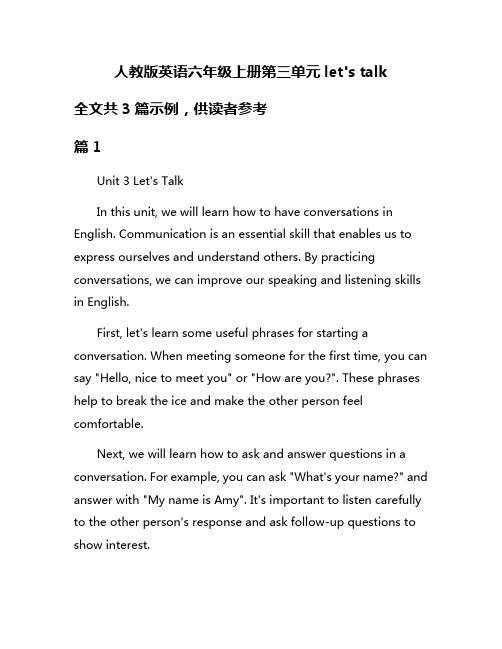
人教版英语六年级上册第三单元let's talk全文共3篇示例,供读者参考篇1Unit 3 Let's TalkIn this unit, we will learn how to have conversations in English. Communication is an essential skill that enables us to express ourselves and understand others. By practicing conversations, we can improve our speaking and listening skills in English.First, let's learn some useful phrases for starting a conversation. When meeting someone for the first time, you can say "Hello, nice to meet you" or "How are you?". These phrases help to break the ice and make the other person feel comfortable.Next, we will learn how to ask and answer questions in a conversation. For example, you can ask "What's your name?" and answer with "My name is Amy". It's important to listen carefully to the other person's response and ask follow-up questions to show interest.In conversations, it's also important to use polite language and manners. Saying "please" and "thank you" shows respect and appreciation. Remember to speak clearly and politely when communicating with others.To practice conversations, you can role-play with a partner or practice speaking with a native English speaker. By engaging in conversations, you will become more confident and fluent in English.In conclusion, learning how to have conversations in English is an important skill that will benefit you in many areas of life. By practicing speaking and listening, you can improve your communication skills and connect with others from different cultures and backgrounds. Let's continue to practice and improve our English conversation skills together!篇2Let's TalkUnit 3 of the sixth grade English textbook from the People's Education Press focuses on conversations and dialogues in various everyday scenarios. In this unit, students will learn how to engage in conversations about their likes and dislikes,preferences, and daily routines. Let's take a closer look at some of the key topics covered in this unit.1. Talking about likes and dislikesOne of the first topics covered in Unit 3 is expressing likes and dislikes. Students will learn how to use expressions such as "I like..." and "I don't like..." to talk about their preferences. They will also learn how to ask others about their likes and dislikes using questions like "Do you like...?" and "What do you like?"2. Talking about preferencesIn addition to likes and dislikes, students will also learn how to talk about their preferences. They will learn how to use expressions like "I prefer..." and "I would rather..." to express their choices. They will also learn how to ask others about their preferences using questions like "Which do you prefer...?" and "Would you rather...?"3. Talking about daily routinesAnother important topic covered in Unit 3 is daily routines. Students will learn how to talk about the activities they do on a daily basis, using expressions like "I get up at..." and "I go to bed at..." They will also learn how to ask others about their dailyroutines using questions like "What time do you...?" and "When do you...?"Overall, Unit 3 of the sixth grade English textbook from the People's Education Press provides a solid foundation for students to engage in conversations about their likes and dislikes, preferences, and daily routines. By mastering the key topics covered in this unit, students will be well-equipped to communicate effectively in a variety of everyday situations. Let's talk!篇3Let's Talk in Unit Three of Grade Six English Language TextbookUnit Three of Grade Six English Language Textbook focuses on communication skills with the topic "Let's Talk". This unit aims to help students improve their English speaking and listening abilities through various interactive activities and conversations. By practicing different dialogues and role plays, students will be able to enhance their confidence in using English in real-life situations.The unit starts with basic greetings and introductions, teaching students how to say "Hello", "How are you?" and "Myname is…". This sets the foundation for the rest of the unit, as students gradually move on to more complex conversational topics such as asking for directions, making plans, and discussing hobbies and interests.One key aspect of this unit is the emphasis on pronunciation and intonation. Students are encouraged to pay attention to how words are pronounced and how sentences are stressed in order to sound more natural when speaking English. By mimicking the teacher and practicing dialogues with their classmates, students can improve their speaking skills and become more fluent in English.In addition to dialogues, students also engage in role plays and group discussions to practice using English in a more interactive and engaging way. Through these activities, students are able to apply what they have learned in real-life situations, which helps them develop their communication skills and build confidence in using English.Overall, Unit Three of Grade Six English Language Textbook provides students with a solid foundation in spoken English and equips them with the necessary skills to communicate effectively in various situations. By practicing dialogues, role plays, and group discussions, students will be able to improve their Englishspeaking and listening abilities and become more confident English speakers.。
人教版六年级英语上册第三单元课件PPT
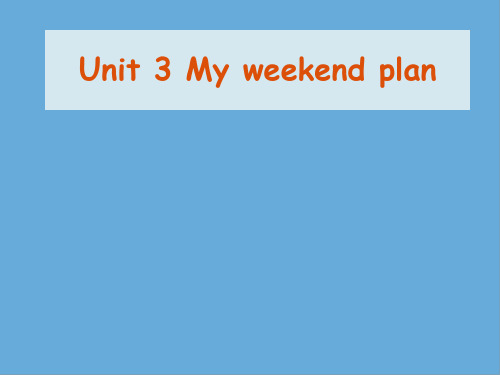
目 录
Part A Let's learn Let's try Make a plan Let's talk
Part B Let's learn Read and write Role-play Tips for pronunciation Let's try Let's check Let's talk Let's wrap it up
▲特殊疑问句:特殊疑问词+be(am/is/are)+主语+going to+动词原形+其他? *be going to与疑问词what连用时,用来询问他人打算做什么。 例: *be going to与疑问词where连用时,用来询问他人将要去哪。 例:
*be going to与疑问词when连用时,用来询问他人打算做某事的时间。 例: *be going to与疑问词who连用时,用来询问谁将要做某事。 例:
-What are you going to do today? -I’m going to …. 这个句型用来询问和回答将要做什么事,时态是一般将来时。
I’m going to … this weekend.
do homework
play computer games
read books
watch TV
book store
bookstore
What are you going to do?
I’m going to buy an English book in the bookstore.
What books can you buy in a bookstore?
PEP人教版小学英语六年级上册Unit3单元教案

PEP人教版小学英语六年级上册Unit3单元教案一、教学内容本单元教学内容为PEP人教版小学英语六年级上册Unit3。
二、教学目标1. 能够听懂、会说、会读、会写以下单词:mine, yours, his, hers, theirs。
2. 能够在日常生活中运用these是复数形式,those是复数形式,yours, mine等物主代词的表达。
3. 能够了解并学会在英语中表达物主代词。
4. 能够在实际生活中运用所学知识,比如说进行日常用品交流。
三、教学重点和难点1. 教学重点:英文物主代词的表达方式。
2. 教学难点:英文物主代词的正确使用。
四、教学准备1. 多媒体设备,如投影仪、扬声器等。
2. 学生配备笔记本、电脑、手机等电子产品。
五、教学方法1. 课堂教学。
2. 互动式教学。
3. 讨论式教学。
六、教学步骤第一步:语音韵律教学通过研究教材中的语音韵律部分,学生了解物主代词的正确发音和读法。
第二步:介绍物主代词老师通过图片和实物的演示和概括,引导学生了解物主代词的概念。
第三步:教授物主代词的使用通过示范和让学生进行模仿,告诉学生物主代词在实际生活中的使用方法。
第四步:句型练分小组进行句型练。
每个小组从研究的词语中选两个进行句型编写,来回练使用物主代词。
第五步:游戏环节老师组织学生分组进行游戏比赛,以此巩固所学知识。
七、作业布置1. 完成教材中的相关题和作业。
2. 搜集5个使用物主代词的例子,写在笔记本上并在班级分享。
八、教学反思本节课教学主要以示范为主,句型练习的方式为辅,对学生的英语口语和语音韵律进行了有针对性有趣味性的训练,不仅提高了学生的英语综合素养,更使学生们更加深入地理解和掌握了所学的物主代词。
同时在教材中增加一些有针对性的知识和实例讲解也是有必要的。
